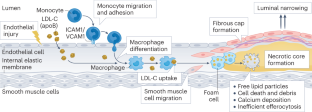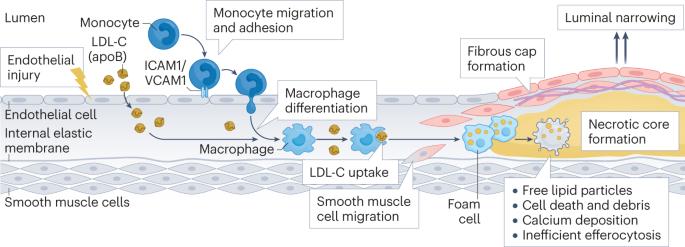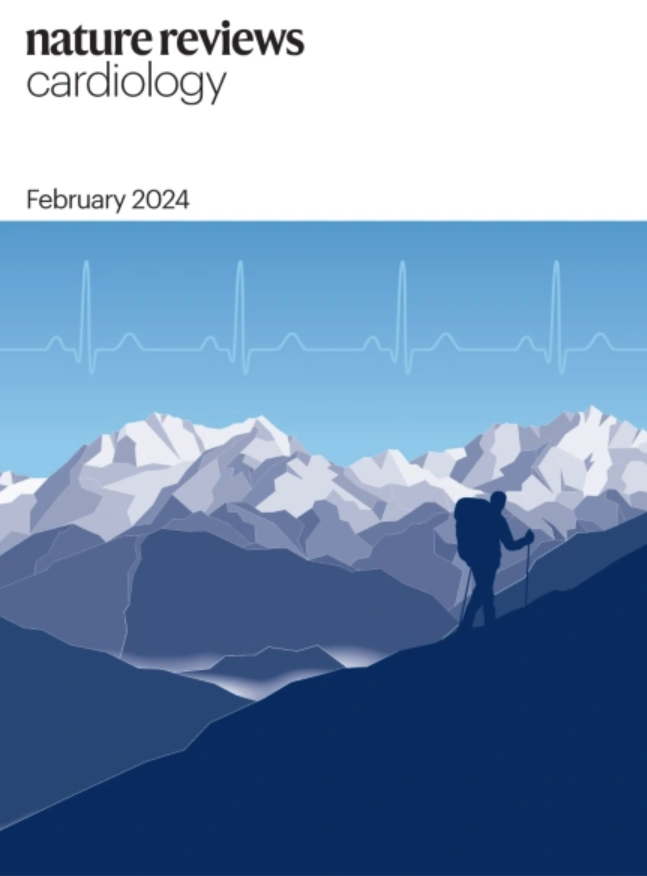动脉粥样硬化斑块的稳定和消退:临床证据综述
IF 41.7
1区 医学
Q1 CARDIAC & CARDIOVASCULAR SYSTEMS
引用次数: 0
摘要
动脉粥样硬化斑块是脂质沉积、炎症变化、细胞迁移和动脉壁损伤之间复杂相互作用的结果。在过去的二十年里,利用血管内超声成像等侵入性动脉成像模式进行的临床试验表明,将致动脉粥样硬化脂蛋白(主要是血清低密度脂蛋白胆固醇(LDL-C))水平降至很低的水平,可以安全地减少动脉粥样硬化斑块的总体负担,并有利地改变斑块的组成。传统上,这种效果是通过强化他汀类药物治疗实现的。自2016年以来,更新、更有效的降脂策略,如9型丙蛋白转换酶-枯草酶-kexin抑制剂,已显示出对斑块消退和临床事件风险的递增效应。尽管血浆低密度脂蛋白胆固醇(LDL-C)水平已降至最低,但在一些患者中仍存在相当大的残余心血管风险。因此,有必要研究在降低低密度脂蛋白胆固醇之外解决残余风险的治疗方法,以促进斑块稳定或消退。冠状动脉计算机断层扫描血管造影术等现代成像模式可对整体动脉粥样硬化斑块负担以及某些局部斑块特征进行无创评估。这项技术可以利用新型治疗方法进一步研究斑块的稳定和消退。无创斑块评估如果得到验证,还可能为个性化管理策略提供指导。本文章由计算机程序翻译,如有差异,请以英文原文为准。


Atherosclerotic plaque stabilization and regression: a review of clinical evidence
Atherosclerotic plaque results from a complex interplay between lipid deposition, inflammatory changes, cell migration and arterial wall injury. Over the past two decades, clinical trials utilizing invasive arterial imaging modalities, such as intravascular ultrasonography, have shown that reducing levels of atherogenic lipoproteins, mainly serum LDL-cholesterol (LDL-C), to very low levels can safely reduce overall atherosclerotic plaque burden and favourably modify plaque composition. Classically, this outcome has been achieved with intensive statin therapy. Since 2016, newer and potent lipid-lowering strategies, such as proprotein convertase subtilisin–kexin type 9 inhibition, have shown incremental effects on plaque regression and risk of clinical events. Despite maximal reduction in plasma LDL-C levels, considerable residual cardiovascular risk remains in some patients. Therefore, there is a need to study therapeutic approaches that address residual risk beyond LDL-C reduction to promote plaque stabilization or regression. Contemporary imaging modalities, such as coronary computed tomography angiography, enable non-invasive assessment of the overall atherosclerotic plaque burden as well as of certain local plaque characteristics. This technology could allow further study of plaque stabilization and regression using novel therapeutic approaches. Non-invasive plaque assessment might also offer the potential to guide personalized management strategies if validated for this purpose. In this Review, Sarraju and Nissen summarize the clinical trial evidence for coronary atherosclerotic plaque stabilization and regression with plasma LDL-cholesterol-lowering therapy and other treatments. Invasive and non-invasive imaging modalities used to assess plaque burden and composition are discussed.
求助全文
通过发布文献求助,成功后即可免费获取论文全文。
去求助
来源期刊

Nature Reviews Cardiology
医学-心血管系统
CiteScore
53.10
自引率
0.60%
发文量
143
审稿时长
6-12 weeks
期刊介绍:
Nature Reviews Cardiology aims to be the go-to source for reviews and commentaries in the scientific and clinical communities it serves. Focused on providing authoritative and accessible articles enriched with clear figures and tables, the journal strives to offer unparalleled service to authors, referees, and readers, maximizing the usefulness and impact of each publication. It covers a broad range of content types, including Research Highlights, Comments, News & Views, Reviews, Consensus Statements, and Perspectives, catering to practising cardiologists and cardiovascular research scientists. Authored by renowned clinicians, academics, and researchers, the content targets readers in the biological and medical sciences, ensuring accessibility across various disciplines. In-depth Reviews offer up-to-date information, while Consensus Statements provide evidence-based recommendations. Perspectives and News & Views present topical discussions and opinions, and the Research Highlights section filters primary research from cardiovascular and general medical journals. As part of the Nature Reviews portfolio, Nature Reviews Cardiology maintains high standards and a wide reach.
 求助内容:
求助内容: 应助结果提醒方式:
应助结果提醒方式:


